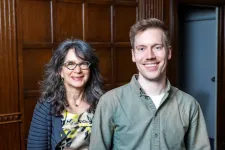(Press-News.org) We all lose our car keys or our glasses from time to time. Most people would be correct to laugh it off as a normal part of aging. But for others, cognitive decline may start as a worrying but clinically unnoticeable step toward cognitive impairment, be it relatively mild or as severe as Alzheimer’s disease.
The vast complexity of the human brain makes early diagnosis of cognitive decline difficult to achieve, which has potentially important implications for treatment and prevention. This is especially true for subjective cognitive decline, in which an individual reports concerns about memory or cognitive ability but shows no deviation on cognitive tests administered by clinicians.
That’s the focus of a new paper in the journal Cortex by Concordia PhD student Nicholas Grunden and Department of Psychology professor Natalie Phillips. In it they use a novel technique called network analysis to study whether it can reveal the subtle changes associated with subjective cognitive decline that cannot be detected through standard test analyses.
A network approach models cognitive performance as a web of intertwined cognitive abilities that reflects the relationships between a set of variables, or nodes. The nodes here are the results of several neuropsychological tests, as well as participant characteristics like age, sex and education.
By running a statistical analysis of data merged from two large Canadian data sets, the researchers were able to visualize the strength of relationships between the nodes among people who are classified as cognitively normal (CN), or who have diagnoses of subjective cognitive decline (SCD), mild cognitive impairment (MCI) or Alzheimer’s disease (AD).
“The nodes are connected by edges, which are the conditional associations between them,” Grunden says. “The edge reflects how those variables work together. Are they positively correlated or negatively correlated? The network shows us how strong these associations are by how saturated the edges are. It’s a built-in visual communication of findings.”
Seeing the decline
After constructing the networks using the merged databases, the researchers identified two nodes that exert the strongest influence on the rest of network: performance on tests of executive function and processing speed. Both are known to decline with age.
The strength of these two nodes, however, had marked decreases from the cognitively normal to the subjective cognitive decline to the mild cognitive impairment groups. This progressive gradient places SCD as an intermediate stage between CN and MCI.
“We found that very interesting, because it uncovered something that speaks to individuals’ subjective concerns that are invisible in normal statistical analyses,” Grunden explains.
“Executive function and processing speed are important cognitive abilities in that they contribute to other abilities (e.g., language, attention) and are integral to supporting an individual’s day-to-day functioning in their lives. We know efficiency decreases as we age but we also see them at the initial stages of some types of progressive cognitive decline.”
Age limits
The researchers also noticed an important component to the role of age. While it is one of the strongest predictors of cognitive decline, and it exerted substantial influence on cognitive abilities among those classified CN and SCD, that influence waned among those classified MCI or AD. For them, other nodes measuring cognitive ability take on more weight.
“In other words, all things considered, age will be the biggest influence on cognition for older adults who do not show signs of Alzheimer’s disease,” says Phillips, the Concordia University Research Chair in Sensory-Cognitive Health in Aging and Dementia.
“But that is not the case in those individuals who have a diagnosis of MCI or Alzheimer’s disease. For them, cognitive function is more associated with how advanced their disease is, as indicated by general measures of clinical status on standardized cognition tests like the Montreal Cognitive Assessment Test.”
Grunden says network analysis can help researchers examine brain function as a system rather than isolated variables acting upon each other.
“This helps us read between the lines, because we can look at the interrelationships between all of the variables at the same time,” he says. “You can pick up on indicators that are less apparent in single elements of data and instead focus on associations between them.”
The Fonds de recherche du Québec – Nature et technologies (FRQNT), the Fondation Famille Lemaire and the Centre for Research on Brain, Language and Music contributed funding for this study. The researchers used data from the Consortium for the early identification of Alzheimer’s disease – Quebec (CIMA-Q) and the Comprehensive Assessment on Neurodegeneration and Dementia (COMPASS-ND) databases.
Read the cited paper: “A network approach to subjective cognitive decline: Exploring multivariate relationships in neuropsychological test performance across Alzheimer’s disease risk states.”
END
Cognitive decline may be detected using network analysis, according to Concordia researchers
A novel data visualization and analytical technique shows which variables may best indicate subtle change in brain function
2024-04-09
ELSE PRESS RELEASES FROM THIS DATE:
Clinical trial finds nasal spray safely treats recurrent abnormal heart rhythms
2024-04-09
A clinical trial led by Weill Cornell Medicine investigators showed that a nasal spray that patients administer at home, without a physician, successfully and safely treated recurrent episodes of a condition that causes rapid abnormal heart rhythms. The study, published March 25 in the Journal of the American College of Cardiology, provides real-world evidence that a wide range of patients can safely and effectively use the experimental drug, called etripamil, to treat recurrent paroxysmal supraventricular ...
FAU lands $1.3 million grant to ‘clean up’ stinky seaweed in Florida
2024-04-09
In the last decade, the emergence of a massive expanse of Sargassum, the Great Atlantic Sargassum Belt, has wreaked havoc on ecosystems and economies throughout the Caribbean. Conversely, this stinky brown seaweed provides vital habitats for marine life including loggerhead sea turtles.
One of the worst invasions of Sargassum in recent history, especially for Florida, occurred in 2022 and potential impacts this year are yet to be determined. Decomposing Sargassum produces hydrogen sulfide and ammonia, which can result in potential human and environmental health impacts. Once Sargassum deluges beaches, removing, disposing and repurposing the seaweed presents many logistical ...
Breeding more resilient soybeans may come down to test site selection
2024-04-09
URBANA, Ill. — In the quest to optimize crop productivity across environments, soybean breeders test new cultivars in multiple locations each year. The best-performing cultivars across these locations are selected for further breeding and eventual commercialization. However, a new study from the University of Illinois Urbana-Champaign suggests current soybean testing locations may not be delivering breeders the biggest bang for their buck.
“We met with most of the soybean breeders in public research universities across the Midwest and asked where they set up their trials over the last 30 to 40 years,” said Nicolas Martin, ...
Morphine tolerance results from Tiam1-mediated maladaptive plasticity in spinal neurons
2024-04-09
BIRMINGHAM, Ala. – Morphine and other opioids are vital to treat severe and chronic pain. However, they have two problems — prolonged use creates morphine tolerance, where ever-increasing doses are needed for the same pain relief, and paradoxically, prolonged use also can create an extreme sensitivity to pain, called hyperalgesia.
Researchers at the University of Alabama at Birmingham and Baylor College of Medicine, Houston, Texas, now have shown that blocking the activity of an enzyme called Tiam1 in certain ...
USC-led study leverages artificial intelligence to predict risk of bedsores in hospitalized patients
2024-04-09
Bedsores—also known as pressure injuries—are the fastest rising hospital-acquired condition, according to the U.S. Agency for Healthcare Research in Quality, and as a result have become the second most common reason for medical malpractice suits in the United States.
Although most hospital-acquired pressure injuries are reasonably preventable, approximately 2.5 million individuals in the United States develop a pressure injury in acute care facilities every year, and 60,000 die. The total annual cost for U.S. health systems to manage the acute needs of patients’ ...
IADR announces recipients of the 2024 IADR LION Dental Research Award
2024-04-09
Alexandria, VA, USA – The International Association for Dental, Oral, and Craniofacial Research (IADR) has announced three recipients of the 2024 IADR LION Dental Research Award. The recipients were recognized during the Opening Ceremonies of the 102nd General Session of the IADR, which was held in conjunction with the 53rd Annual Meeting of the American Association for Dental, Oral, and Craniofacial Research and the 48th Annual Meeting of the Canadian Association for Dental Research, on March 13-16, 2024, in New Orleans, LA.
The recipients are:
Andrea Escalante Herrera
University of ...
Cher Farrugia and Wei Qiao named winners of the 2024 IADR STAR Network Academy Fellowship
2024-04-09
Alexandria, VA, USA – The International Association for Dental, Oral, and Craniofacial Research (IADR) has announced Cher Farrugia and Wei Qiao as the winners of the 2024 IADR STAR Network Academy Fellowship. Farrugia, from the University of Bristol, England, UK, and Qiao, from The University of Hong Kong, SAR, China, were recognized during the Opening Ceremonies of the 102nd General Session of the IADR, which was held in conjunction with the 53rd Annual Meeting of the American Association for Dental, Oral, and Craniofacial Research and the 48th Annual ...
Fiorella Ventura named winner of the 2024 IADR Norton Ross Fellowship
2024-04-09
Alexandria, VA, USA – The International Association for Dental, Oral, and Craniofacial Research (IADR) has announced Fiorella Ventura as the winner of the 2024 IADR Norton Ross Fellowship. Ventura, from the University of Buenos Aires, Argentina, was recognized during the Opening Ceremonies of the 102nd General Session of the IADR, which was held in conjunction with the 53rd Annual Meeting of the American Association for Dental, Oral, and Craniofacial Research and the 48th Annual Meeting of the Canadian Association for ...
Diep Ha named winner of the 2024 IADR John Clarkson Fellowship
2024-04-09
Alexandria, VA, USA – The International Association for Dental, Oral, and Craniofacial Research (IADR) has announced Diep Ha as the winner of the 2024 IADR John Clarkson Fellowship. Ha, from The University of Queensland, Australia, was recognized during the Opening Ceremonies of the 102nd General Session of the IADR, which was held in conjunction with the 53rd Annual Meeting of the American Association for Dental, Oral, and Craniofacial Research and the 48th Annual Meeting of the Canadian Association for Dental Research, on March 13-16, 2024, in New Orleans, LA.
Ha is a dentist and a Senior Research Fellow at the University ...
Shivangi Singh named winner of the 2024 IADR David B. Scott Fellowship
2024-04-09
Alexandria, VA, USA – The International Association for Dental, Oral, and Craniofacial Research (IADR) has announced Shivangi Singh as the winner of the 2024 IADR David B. Scott Fellowship. Singh, from King George’s Medical University, Lucknow, India, was recognized during the Opening Ceremonies of the 102nd General Session of the IADR, which was held in conjunction with the 53rd Annual Meeting of the American Association for Dental, Oral, and Craniofacial Research and the 48th Annual Meeting of the Canadian Association for Dental ...
LAST 30 PRESS RELEASES:
Scientists show how to predict world’s deadly scorpion hotspots
ASU researchers to lead AAAS panel on water insecurity in the United States
ASU professor Anne Stone to present at AAAS Conference in Phoenix on ancient origins of modern disease
Proposals for exploring viruses and skin as the next experimental quantum frontiers share US$30,000 science award
ASU researchers showcase scalable tech solutions for older adults living alone with cognitive decline at AAAS 2026
Scientists identify smooth regional trends in fruit fly survival strategies
Antipathy toward snakes? Your parents likely talked you into that at an early age
Sylvester Cancer Tip Sheet for Feb. 2026
Online exposure to medical misinformation concentrated among older adults
Telehealth improves access to genetic services for adult survivors of childhood cancers
Outdated mortality benchmarks risk missing early signs of famine and delay recognizing mass starvation
Newly discovered bacterium converts carbon dioxide into chemicals using electricity
Flipping and reversing mini-proteins could improve disease treatment
Scientists reveal major hidden source of atmospheric nitrogen pollution in fragile lake basin
Biochar emerges as a powerful tool for soil carbon neutrality and climate mitigation
Tiny cell messengers show big promise for safer protein and gene delivery
AMS releases statement regarding the decision to rescind EPA’s 2009 Endangerment Finding
Parents’ alcohol and drug use influences their children’s consumption, research shows
Modular assembly of chiral nitrogen-bridged rings achieved by palladium-catalyzed diastereoselective and enantioselective cascade cyclization reactions
Promoting civic engagement
AMS Science Preview: Hurricane slowdown, school snow days
Deforestation in the Amazon raises the surface temperature by 3 °C during the dry season
Model more accurately maps the impact of frost on corn crops
How did humans develop sharp vision? Lab-grown retinas show likely answer
Sour grapes? Taste, experience of sour foods depends on individual consumer
At AAAS, professor Krystal Tsosie argues the future of science must be Indigenous-led
From the lab to the living room: Decoding Parkinson’s patients movements in the real world
Research advances in porous materials, as highlighted in the 2025 Nobel Prize in Chemistry
Sally C. Morton, executive vice president of ASU Knowledge Enterprise, presents a bold and practical framework for moving research from discovery to real-world impact
Biochemical parameters in patients with diabetic nephropathy versus individuals with diabetes alone, non-diabetic nephropathy, and healthy controls
[Press-News.org] Cognitive decline may be detected using network analysis, according to Concordia researchersA novel data visualization and analytical technique shows which variables may best indicate subtle change in brain function





